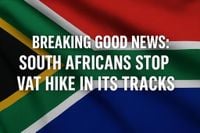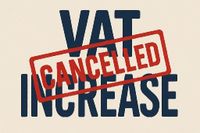On Thursday, April 24, 2025, South Africa's National Treasury announced a significant reversal of its proposed value-added tax (VAT) increase, which was set to take effect on May 1, 2025. This decision comes after mounting pressure from political parties and civil society groups, who expressed strong opposition to the hike. The Minister of Finance, Enoch Godongwana, will soon introduce the Rates and Monetary Amounts and the Amendment of Revenue Laws Bill (Rates Bill), which proposes to maintain the VAT rate at 15 percent.
The initial plan was to increase the VAT by 0.5 percentage points this year and another 0.5 percentage points in 2026, aimed at addressing a budget deficit estimated at $4.02 billion (R75 billion). However, the proposal faced widespread backlash, with many South Africans fearing that the increase would disproportionately affect low-income households already struggling with high living costs.
In a statement, the National Treasury noted that the decision to forgo the VAT increase followed extensive consultations with major political parties and careful consideration of recommendations from parliamentary committees. "By not increasing VAT, estimated revenue will fall short by around R75 billion over the medium term," the Treasury stated. Consequently, Godongwana has communicated to the Speaker of the National Assembly his intention to withdraw the Appropriation Bill and the Division of Revenue Bill to propose expenditure adjustments to cover the revenue shortfall.
The announcement of the VAT reversal was made in the early hours of Thursday morning, shortly after midnight, marking a significant moment in South Africa's fiscal policy. "Without a VAT increase, spending cuts are the only game in town realistically," a senior finance ministry source told the Daily Maverick.
This backtrack has been welcomed by many South Africans, who had been bracing for immediate price increases on goods and services as service providers warned of impending hikes. The now-shelved VAT increase would have strained household budgets, especially for those already facing financial hardships.
Political dynamics played a crucial role in the reversal. The African National Congress (ANC) and the Democratic Alliance (DA) have been at odds over the proposal, with the DA challenging the VAT increase in court and voting against the budget's fiscal framework. Helen Zille, a senior DA official, confirmed that the party was awaiting a formal settlement regarding its legal challenge against the VAT hike.
Despite the decision to maintain the VAT rate at 15%, the Treasury warned that difficult spending cuts lie ahead to address the budget shortfall. These cuts may include the withdrawal of cash transfers to low-income households, a move that could exacerbate existing inequalities in a country where over 30% of the population is unemployed.
The planned VAT increase was initially motivated by the need to restore funding for critical frontline services that have suffered due to years of budgetary constraints. However, the potential negative impact on household spending and economic growth led to a unified outcry from various political factions and civil society.
Research from the University of Pretoria and the National Agricultural Marketing Council indicated that the VAT hike could have reduced household spending, trimmed GDP, and pushed inequality even further. Although the increase might have raised R13.5 billion annually on paper, the real cost to South Africans would have been far greater, affecting their dignity and quality of life.
While the government has scrapped the VAT increase, the fiscal challenges remain. The Treasury is expected to propose adjustments to the budget to cover the revenue shortfall, and Finance Minister Godongwana is set to introduce a revised version of the Appropriation Bill and Division of Revenue Bill in the coming weeks.
The decision to maintain the VAT rate at 15% has been framed as a victory for the collective voice of the nation, showcasing the power of public dissent in influencing government policy. As South Africans continue to navigate the complexities of economic recovery, the reversal of the VAT increase serves as a reminder of the importance of civic engagement and the role of democratic processes in holding power accountable.
Looking forward, the government faces the challenge of addressing the budget deficit without further burdening citizens who are already feeling the weight of economic mismanagement. The Treasury has acknowledged that while there are many suggestions to address the shortfall, some could have negative consequences for growth and employment.
In conclusion, the withdrawal of the VAT increase proposal marks a pivotal moment in South Africa's fiscal policy landscape, reflecting the government's responsiveness to public sentiment and the need for a balanced approach to economic recovery. As the country moves ahead, it will be crucial for policymakers to consider the impacts of their decisions on the most vulnerable populations, ensuring that the path to fiscal sustainability does not come at the expense of social equity.


